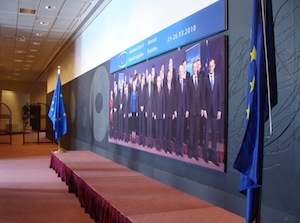As Europe’s financial and economic catastrophe morphs into a full-scale constitutional crisis, where is leadership to be found, asks Ben Tonra.
Two landmark interventions; that of the German philosopher Jurgen Habermas and that of Polish Foreign Minister Radosław Sikorski offer some striking contrasts. Both identify political weakness in Berlin as a major contributory factor but they appear to differ quite profoundly on the appropriate prescription.
Sikorski’s dramatic call on Germany to shoulder its political and economic responsibilities for Europe’s rescue was framed in an oddly traditional way. Further economic integration — up to and including a fiscal union — is clearly on the table, but Sikorski was working within a firmly intergovernmental model. This would provide for immeasurably tighter monitoring and supervision of national budgets through the European Council and Council of EU Finance Ministers and/or the Eurogroup of ministers. This would be offered in exchange for eurozone burden sharing of national debt and borrowing. Sikorski’s essential critique of the German government was that it had offered no clear map as to how to achieve this, either through existing treaty provisions or proposals for treaty change. Moreover, he seemed to suggest that the scale and pace of the crisis’ development did not lend itself to the unsophisticated game of ‘chicken’ being played by Germany vis-á-vis both markets and other EU member states. The fact that such a call for assertive German leadership was coming from a senior Polish government minister, lent an obvious frisson to the argument.
By contrast, the critique of Jurgen Habermas was that the failure of German leadership rested in that government’s unwillingness to grasp Europe’s urgent need for democracy and accountability. In a useful note, the Centre for European Reform had styled this as the triumph of de Gaulle over Monnet: a Europe des patries rather than a Europe tout court. The emergence of the so-called Frankfurt Group is symptomatic of this shift, being an economic directoire in all but name. For Habermas, however, the danger is much greater. European integration has already moved far beyond anything de Gaulle might have considered and the democratic moorings of the entire European project are coming loose. For Habermas, the European Council and eurozone finance ministers are, in effect, walking away from their essential responsibilities and subcontracting decision making either to markets or to committees of technocrats in thrall to markets. For him, essential political accountability and responsibility is being lost.
Decsion time in Europe
Europe now faces choices whose significance is at least on a par with those taken in the aftermath of the Second World War. Basic social contracts within member states are under extreme pressure and the very foundations of socio-economic policy making are being recast. This cannot be accommodated in democratic societies without the means by which such decisions are validated and held accountable. If national budgetary decision-making is to be placed within a strong collective European framework, then that framework has also to be made legitimate and accountable. The European Council (and its associated thematic councils), is not fit for that purpose; either in principle or in practice.
The principled arguments surrounding the democratic weaknesses of the European Council are well rehearsed and Habermas pulls no punches in talking about an effective coup d’etat within the European institutions. For those, however, who view the crisis as being so acute as to make principles a luxury we can ill afford, note should also be taken of the Council’s practical weaknesses. Any proposed model of eurozone economic governance has to have both capacity and credibility. The European Council has shown itself to have neither. Over the last few months, its capacity to react effectively to market challenges has been widely, if not universally, denounced. The nature of its decision-making and the political realities which rest behind the need for consensus fatally undermine its capacity to act and, as we have seen in recent months, have contributed substantively to the contagion now gripping the markets. Nor is this simply a function of lacking the requisite tools. The Council was incapable of even implementing its own rules within the Stability and Growth Pact — most notably giving a ‘pass’ to Germany and France when they broke its terms. The Council has thus little or no credibility as forum within which national governments — and, most especially, the most powerful national governments can be held to account.
With even the scourge of the Lisbon treaty, Declan Ganley, calling for a fully federal Europe perhaps the normal laws of political gravity no longer apply. It is certainly true to say, however, that if European governments elect to proceed on a course which creates a fiscal union in support of the single currency, their choices may well have to reflect the realities of international markets but they must also respect the demands of democratic accountability.
Image by ines saraiva. CC licenced.
Was this article useful? If so we are delighted!
It is freely available because we believe that the right to free and independent information is essential for democracy. But this right is not guaranteed forever, and independence comes at a cost. We need your support in order to continue publishing independent, multilingual news for all Europeans.
Discover our subscription offers and their exclusive benefits and become a member of our community now!












